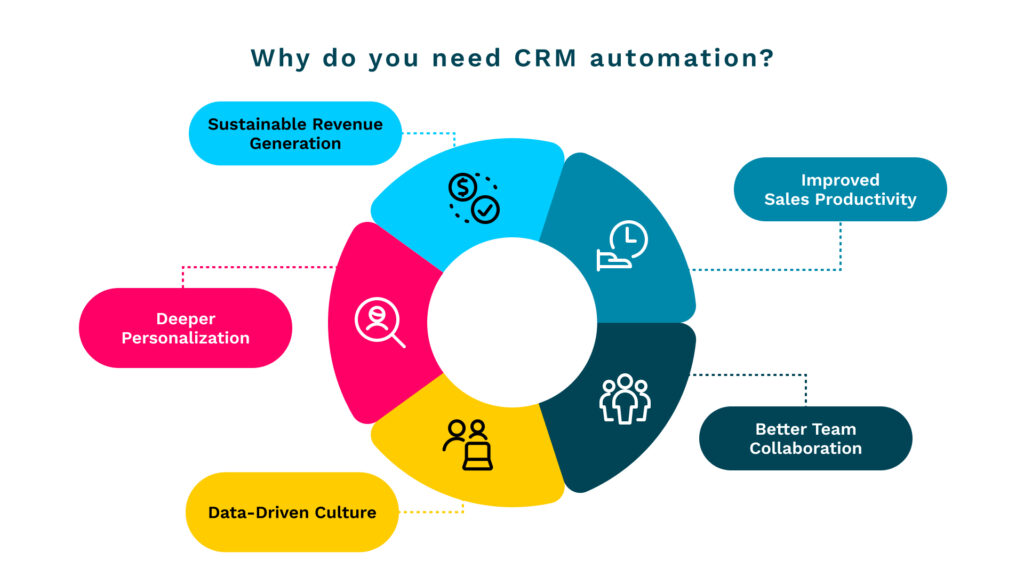
Top 5 CRM Automation Use Cases for RevOps
Optimize your revenue operations with CRM automation. Explore real-world use cases and boost efficiency. Discover the power of RevOps today.
CRM is the soul of every modern business today. It serves as the epicenter for managing customer relationships and sales processes.
But, what gives it that special edge?
CRM automation – that’s right! The automation capabilities take it to a whole new level.
With automation, businesses have stopped wasting resources on repetitive tasks that have minimal to no impact on their revenues. Instead, they just let the CRM take care of these tasks helping them streamline operations, facilitate efficiency, and allocate more time to meaningful customer interactions.
And, that’s not all – CRM and its automation features can do much more.
In this article, we will keep CRM automation at the forefront and discuss the top five use cases through which you can maximize the ROI from your CRM.
What is CRM Automation?
CRM automation refers to leveraging technology to streamline and simplify various tasks and workflows of your business. It automates repetitive, manual tasks that otherwise hamper productivity. And truth be told, AI is simply upping the game now.
Who doesn’t want a helping hand that takes care of data entry, sends personalized follow-up emails, and even reminds when it’s time to reach out to a customer?
94% of employees say they perform repetitive, time-consuming tasks in their role. With CRM automation, your teams can leave behind repetitive tasks and focus on high-value activities such as building relationships and delivering personalized experiences.
But there’s more to it, which is why we will now delve into why exactly CRM automation has become omnipotent today.
Why Do You Need CRM Automation?
In today’s rat race of businesses, the need for CRM automation has become more critical than ever. CRM automation has the potential to turn your business outcomes upside down. Here’s how.
1. Improved sales productivity
Free up precious resources and automate repetitive processes. Let technology handle data entry, lead tracking, and follow-ups, allowing your team to focus on revenue-driving sales activities that push your business forward.
According to McKinsey, automation can boost global productivity growth by 0.8-1.4 % every year.
2. Better team collaboration
CRM automation facilitates seamless collaboration between teams. Sales, marketing, and customer service departments can access real-time customer data, track interactions, and coordinate efforts. This collaboration ensures a harmonious approach, leading to satisfactory customer experiences and streamlined operations.
3. Data-driven culture
Data is everywhere, constantly present and ever-growing, but analyzing it manually can be overwhelming. Since 85% of data is unstructured, automation is critical for a business to save time and minimize mistakes.
CRM automation captures and organizes data, providing you with valuable insights at your fingertips. Make data-driven decisions, identify trends, and uncover opportunities for optimization and growth.

4. Deeper personalization
Whether you’re selling, marketing, or supporting your customers, personalization is the new black and for that, you probably don’t want to miss any details. CRM automation enables you to deliver tailored and timely interactions with customers. Automated workflows ensure that no leads fall through the cracks and that every customer receives the attention they deserve, resulting in more satisfaction and loyalty.
5. Sustainable revenue generation
At the end of the day, it’s all about the bottom line. CRM automation empowers you to optimize your revenue operations, identify cross-sell and upsell opportunities, and nurture leads effectively. By aligning your teams and processes, you create a well-oiled revenue engine.
It comes as no surprise that 61% of businesses leveraging automation reported exceeding revenue targets in 2020.
5 Use Cases of CRM Automation
A CRM comes with a wealth of possibilities for your business. We will now explore the top 5 use cases to improve your CRM’s ROI.
1. Contact automation
Don’t let the important contact data sit idle. Use a CRM to automate contact data capture from your reps’ inboxes, calendars, and Zoom meetings. The platform can efficiently organize contacts by segmenting them according to their affinity and level of involvement in current opportunities. The CRM can also automatically build buying committees and keep the contact information updated.
The numbers say it all. Companies that incorporate high-level automation into their sales process generate around 16% more leads compared to those that incorporate low-level or no automation.
2. Personalize customer service & onboarding
60% of consumers say they’ll become repeat customers after a personalized experience. If you want to offer personalized support right from the beginning of the customer journey, you need the right data. And what better source than CRM to gather all the data required for personalizing the customer experiences?
All relevant customer information stored in one centralized hub which is your CRM helps automate customer onboarding workflows, guide customers through each step, and offer them necessary resources proactively. A complete view of each customer’s history, preferences, and interactions in the CRM empowers businesses with the data they need to address customer needs promptly thereby delivering consistent and personalized experiences.
3. Run lucrative marketing campaigns
The top marketing priority of 44% of businesses is increasing revenue from current customers. To yield such results, a CRM becomes vital for businesses to run effective marketing campaigns. They can use the customer data in the CRM for targeting and segmentation of their audience.
Businesses can further personalize their messaging to resonate with specific customer segments, improving the conversion rate. CRM automation also plays a pivotal role by simplifying campaign workflows and automating email sequences for timely customer engagement.
To go one step ahead, you can also integrate CRM with marketing tools to enhance reach and enable cross-channel campaigns. Robust tracking and analytics of CRM provide businesses with insights into campaign performance, enabling them to optimize strategies for higher campaign returns.
4. Identify business opportunities and trends
Harness CRM analytics to dive deep into customer behavior, trends, and campaign performance. Understand hidden patterns, identify opportunities, and make data-backed decisions that will certainly take your business forward.
The analytics are important to identify high-potential prospects, understand their pain points, and tailor your sales pitches accordingly. With a CRM, you also get a detailed view of the sales pipeline, allowing your team to identify bottlenecks and optimize the sales process. The impact is evidently huge as 62% of retailers have stated that using big data gives them a competitive advantage.
5. Reliable sales forecasting
With all the data captured in your CRM, you’re in a better position to predict your sales. The automated workflows ensure the right data is stored so that it can be leveraged to understand the sales and revenue trends.
This way your teams can have a clear view of your business’s future and accordingly they can allocate resources to minimize the wastage or shortfalls. Whether it’s expanding your team, adjusting marketing efforts, or optimizing inventory levels, CRM ensures you have a solid foundation for future-proof growth plans.
Boost the ROI of Salesforce CRM With Nektar’s CRM Automation
Turn your salesforce CRM into a super-CRM with Nektar’s advanced data capture capabilities and intelligent insights. Don’t let the manual data entry and tedious processes hold your reps back.
Harness the power of AI-driven automation to streamline workflows, track leads and manage deals. Get detailed visibility from lead generation to renewal and expansion and rise above the average CRM performance. That’s not it, you can also recover lost relationships from past customer interactions.
Upgrade to Nektar today and experience the next level of CRM excellence.
PUBLISHED BY






